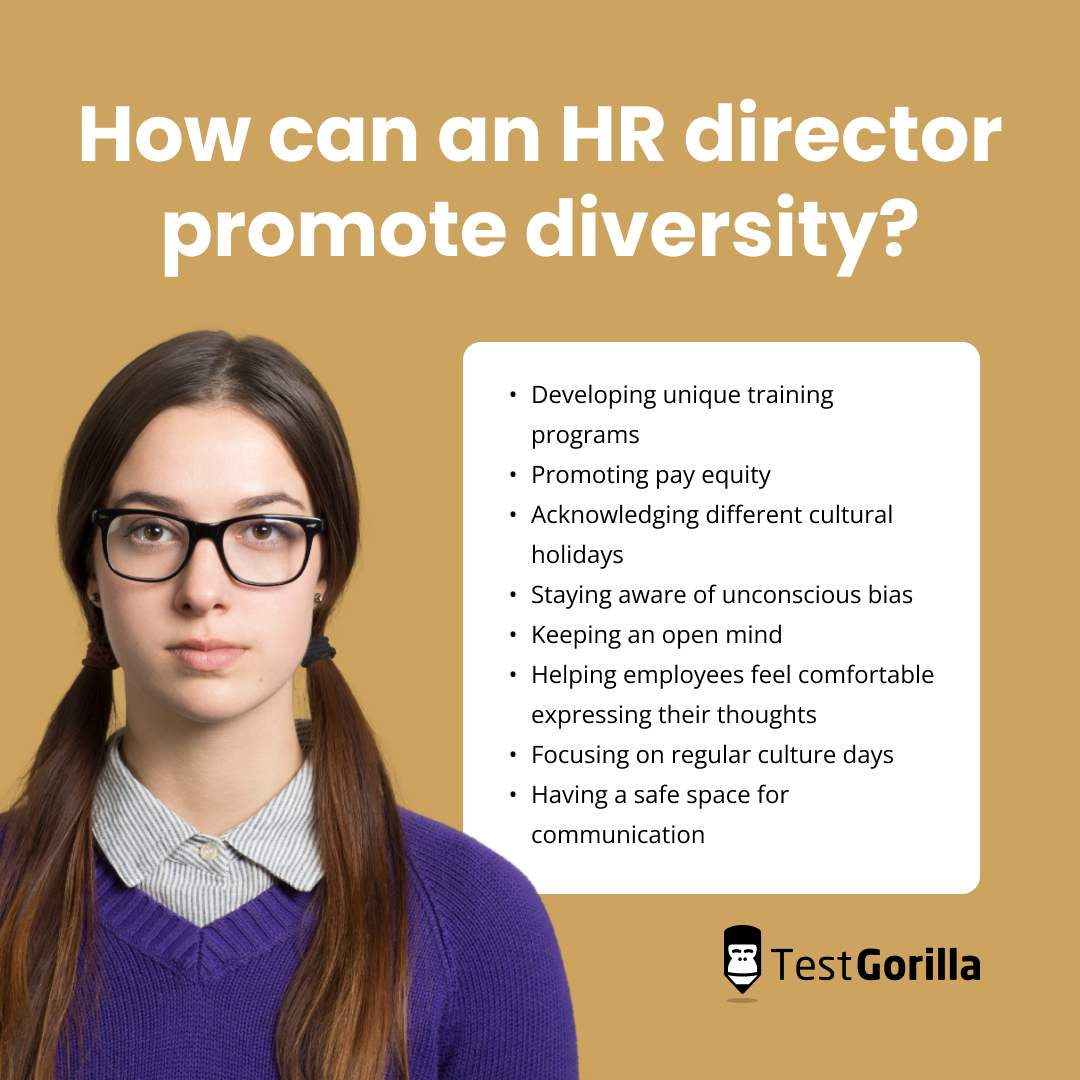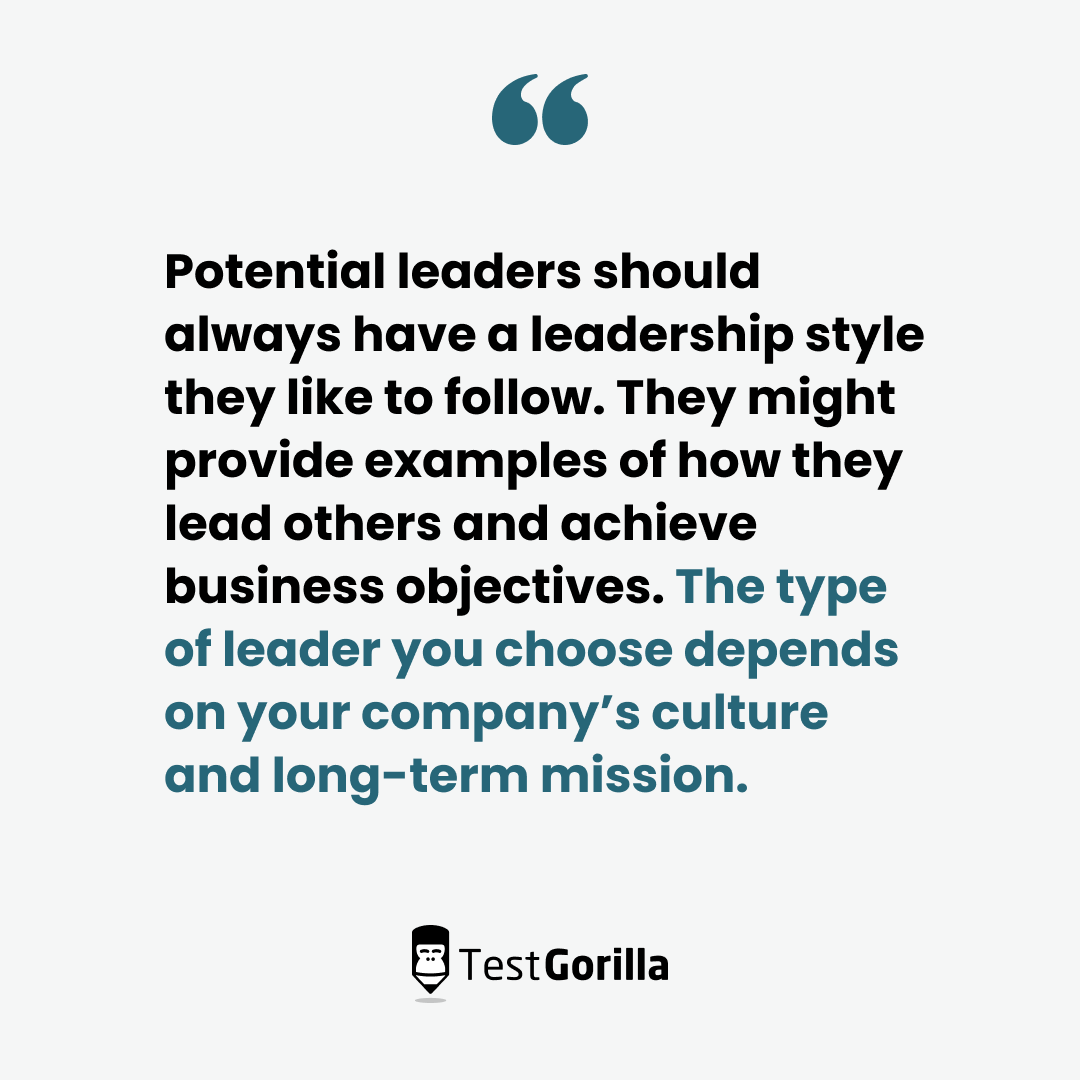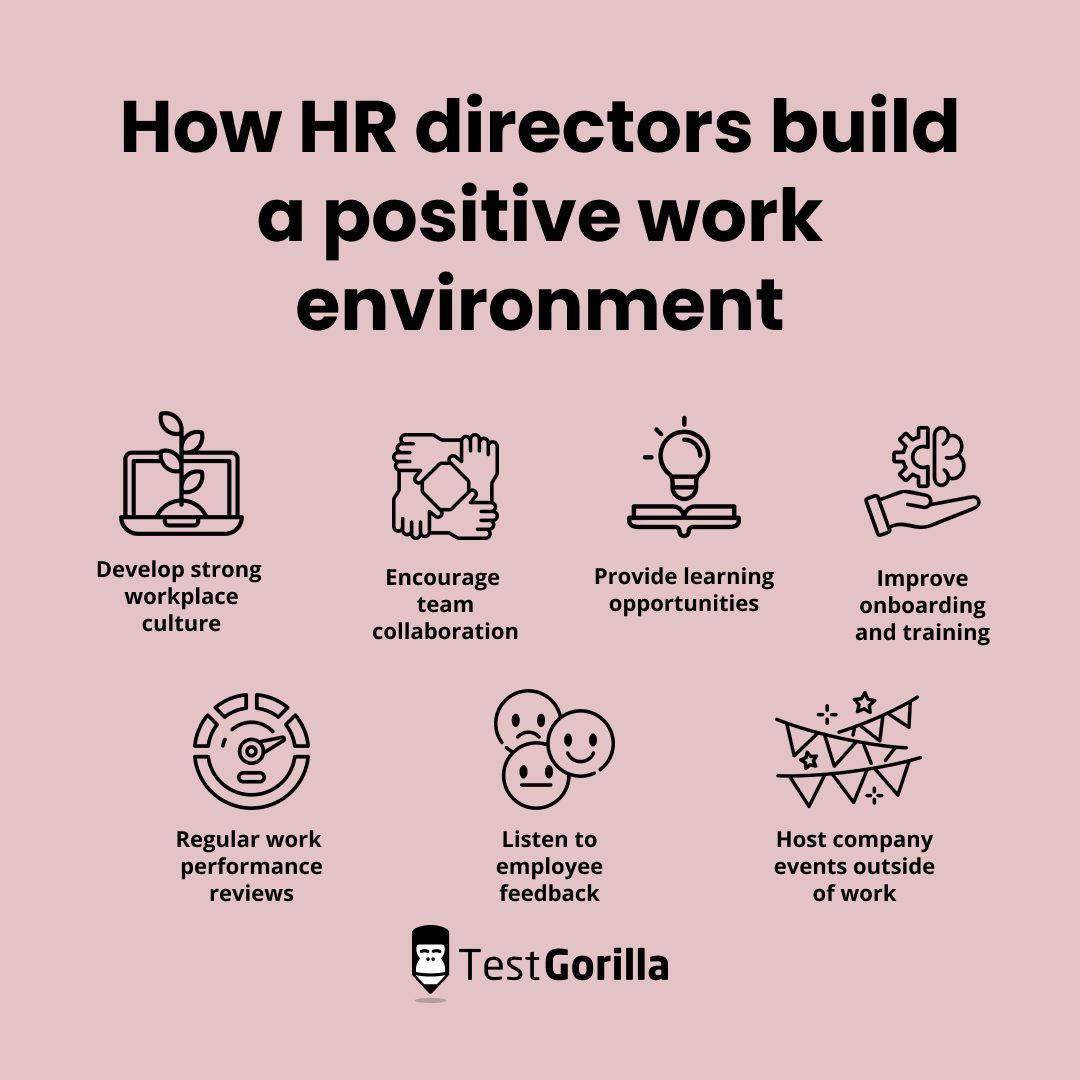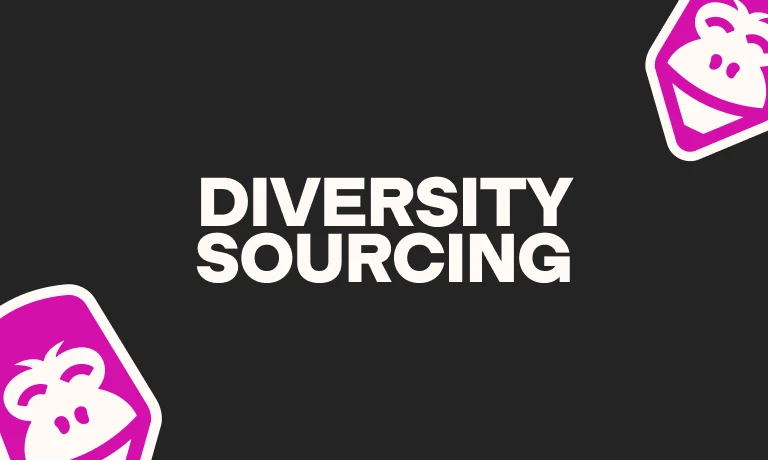20 HR director interview questions to ask potential leaders
Roles in the HR department can be demanding but rewarding. A candidate who takes on the director position should feel comfortable with creating and implementing creative business strategies.
To find the best candidates, you need to use a skill assessment. The HR Management test allows you to evaluate their decision-making skills, while a HR Fundamentals test is best suited to beginners and entry-level candidates.
Using either test as part of a wider skills assessment ensures you only interview candidates with relevant skills.
After the skills assessment, it’s time to look at some interview questions. Check out our list of 20 HR director interview questions to help you identify potential leaders for your company.
20 HR director interview questions to ask job applicants when learning about their skills
Asking the right questions ensures you hire a candidate with strong leadership and communication skills. You need to better understand their management style, expectations, and goals when working in human resources and collaborating with teams.
Below are 20 HR director interview questions to ask your candidates.
1. What’s your experience with HR software?
Candidates should provide examples of HR software and explain how they would use these tools to complete daily tasks. For instance, they might have the most experience with Microsoft Excel because it suits common functions like payroll, attendance, and annual leave.
Additionally, Google Workspace can help HR directors use collaboration tools and secure important information like finances.
Send candidates a Microsoft Excel test to better understand their technical skillsin this area. Candidates in the HR director role should be able to create graphs for tracking data and design a table for adding statistics.
2. How do you ensure the company’s objectives align with your strategic goals?
A HR director should always have strategic goals, but it’s important that those goals make sense for the company’s direction.
You need to hire a potential leader who is constantly assessing the company’s long-term progression and weak spots for improvement.
3. How do you stay current and ensure compliance with employment laws?
Employment laws can change, so it’s essential that candidates stay up to date with these laws when seeking a role in HR.
They could sign up to email groups that send regular updates regarding employment laws, or join newsletters that cover legal compliance and regulatory risks. The ideal candidate should be determined to comply with local, state, and federal employment laws.
4. What are the key KPIs you use to measure employee performance?
KPIs are key performance indicators that help the HR department measure employee engagement and performance. Beginner candidates may not have experience with this metric, but they should still know what they are and how they can benefit HR.
Candidates may mention the following key performance indicators:
Customer retention and satisfaction
Number of hires
Employee net promoter score (NPS)
Average employee experience
Completed performance reviews
Performance management
Total number of customer interactions
5. What is your vision for the HR department of our company?
Candidates should have a plan for what they wish to achieve in your company. Their answer will prove whether they are determined to succeed and make positive changes.
For example, after doing research on your company, they might want to adjust or enhance your hiring process. Be sure to note their responses to see which candidate has similar goals to your company’s mission.
6. If we hire you for the role, what goals would you create first in order to succeed?
Similar to the above question, candidates need to have goals. Anyone who sets short- and long-term goals can consistently strive for self-development, like improving their skills or knowledge.
For instance, the candidate may discuss their personal development goals for becoming a strong HR director. One goal includes improving their emotional intelligence to communicate better and build relationships.
Use a Motivation test to determine whether the candidate’s work ethic aligns with your company’s main objectives.
7. Tell me about a time when you felt overwhelmed at work. How did you reduce your stress?
Employee burnout is mentally and physically draining. Those who experience this stress may suffer from fatigue and low productivity levels.
Since HR is demanding, it’s essential to hire a candidate who can manage their stress levels. Encourage candidates to talk about a time they felt stressed and how they managed it.
Some common ways of preventing burnout include taking regular breaks or focusing on work-life balance.
Give candidates a Time Management test to see how they plan projects and manage their time in the HR department. This assessment is a good indication of how your candidates may deal with their workload and prioritization.
8. What does quality mean to you?
Quality can mean different things to everyone. One candidate may think of completing work to a high level of perfection, while others care more about building a positive work environment where team members feel comfortable.
Keep in mind that perfection is unattainable, and those who will spend a great deal of time trying to achieve it in their work may not be the best fit if high output and deadlines are crucial in the role.
9. If one of your employees made a serious mistake, what would you do?
Candidates should know that everyone makes a mistake from time to time. However, you need to hire an HR director who acknowledges the mistake and helps the employee to fix it.
They shouldn’t make team members feel guilty for what they did. Instead, the candidate should mention how they would help employees overcome a serious mistake and prevent it from happening again.
10. What do you do to promote diversity at work?
Promoting diversity is essential when focusing on workplace culture. HR directors should have the determination to foster inclusion and gain new perspectives. Companies with diverse teams can enhance employee performance and expand their talent pools to attract unique and motivated candidates.
The ideal candidate will mention ways to promote diversity, which include:
Developing unique training programs
Promoting pay equity
Acknowledging different cultural holidays
Staying aware of unconscious bias
Keeping an open mind
Helping employees feel comfortable expressing their thoughts
Focusing on regular culture days
Having a safe space for communication
11. What are common HR risks companies face, and how would you minimize or prevent them?
A strong HR director will understand potential risks in a company. They should have set plans that can prevent these risks and protect the company’s work environment and ethics.
Common HR risks include:
Critical skills shortage
Loss of productivity
Decreased employee morale
Employee turnover expenses
Network and data security risks in HR software
Failed succession planning
Broken compliance and regulation
12. Describe your leadership style.
Potential leaders should always have a leadership style they like to follow. They might provide examples of how they lead others and achieve business objectives. The type of leader you choose depends on your company’s culture and long-term mission. Always listen to candidates who have the determination to improve their skills in the HR director role.
Some common leadership styles include:
Coach: This leader focuses on nurturing strengths in the team. They like to see others improve and grow their confidence over time.
Visionary: A visionary leader thinks about the future and how team members can create suitable goals. It’s important for these people to set big goals and unite employees through them.
Servant: Those with servant leadership empower teams to succeed. Through meetings and one-on-one talks, they can inspire others to stack on track with their projects.
Autocratic: Candidates with this leadership style may listen to their own judgment rather than gain advice from team members. They always make decisions based on their personal opinion.
Laissez-faire: This relaxed leadership allows employees to explore ideas on their own behalf. The leader takes a step back from the team instead of making all of the decisions.
Democratic: Democratic leadership is very popular among those who want to keep things fair. These leaders listen to all perspectives, ideas, and opinions before making a decision that will benefit the entire team.
Pacesetter: A pacesetter leader only cares about achieving goals. They set high standards to ensure they and employees can use their motivation to work toward a similar goal.
Transformational: These leaders seek positive organizational change. Candidates who fall into this type will want to constantly improve to satisfy the company’s overall mission.
Transactional: A transactional leader wants efficiency and sustainability. They usually reward employees for hard work and punish those who do wrong or don’t put in much effort.
Bureaucratic: Finally, those in the bureaucratic category rely on company policies when making decisions. If a team member suggests an idea that clashes with the policy handbook, the leader won’t listen.
Use a Leadership & People Management test to see how candidates support and influence the development of others. You can also determine which candidates have the potential to grow as a leader in your company.
13. What strategy or policy did you implement at your previous job that you are most proud of?
Candidates with relevant experience should feel confident answering this question. They might talk about their plans for improving a company in the past.
For example, one candidate may feel passionate about creating enjoyable training programs because they enhance employee productivity and engagement. Other candidates may focus on social events to help team members feel more comfortable expressing their ideas.
14. What would you do if you noticed the company had a high employee turnover rate?
Employee turnover rate measures the number of employees who leave a company during a specific time frame. A higher rate means you’re losing more employees who may feel unsatisfied or unhappy in their roles.
The ideal HR director will act immediately upon noticing the increased turnover rate. They might create a strategic plan to increase employee retention over the next few months. It’s essential that those in HR management have the skills to keep all team members engaged.
A HR director may typically do the following:
Reward employees more for their continuous efforts
Update compensation and employee benefits
Offer competitive salaries after doing market research
Prioritize work-life balance
Focus on improving the workplace environment
Allow opportunities for development
Be transparent with employees
15. Do you think company culture is important?
A positive workplace culture ensures employees feel happy and engaged. As a HR director, the candidate should rate culture high on the priority list. If they don’t, it may be a sign that they aren’t willing to make positive changes for the company.
Note their responses to determine which candidates care more about developing a healthier workplace.
Candidates may also mention different cultures, such as:
Adhocracy: This type of environment focuses on creativity, innovation, and flexibility. Leaders in the adhocracy culture are inspiring people who can take risks to progress the company.
Learning: In this workplace, team members have the encouragement to improve and develop their skills through training opportunities.
Consider sending candidates a Culture Add test to ensure you hire someone with similar goals, expectations, and behaviors.
16. How do you deal with conflict between team members?
Conflict will happen in any job due to differing opinions or stress. It’s essential that HR directors help settle disagreements to ensure every team member is comfortable and satisfied.
When interviewing candidates, make sure they discuss private meetings and the need for active listening.
Send candidates a Problem-Solving test to see how they respond to complex situations like employee conflict. You can also determine which candidates have the motivation and mindset to resolve conflict professionally.
17. What is your process for terminating employees?
Employee termination is never an easy process, but candidates with the right experience and knowledge should know how to navigate this tricky situation.
The usual process is to inform the employee in a private meeting and provide details such as their final paycheck, leave date, and benefits. A HR director needs to be polite and respectful during this time, especially if the candidate finds the news unexpected.
18. How do you stay up to date with recent trends in the HR industry? Are you interested in any new technology?
This question determines whether candidates are passionate about the HR industry. You can learn about their technology interests and how they prefer to find recent trends.
For example, one candidate may follow social media accounts that cover HR advancements while another candidate attends news conferences.
19. How do you build a positive work environment?
A HR director needs to have the mindset and knowledge to build a positive work environment for employees and team members. Candidates who have strategies in mind are more likely to show determination in your company.
Some ways to build a positive work environment include to:
Develop a strong workplace culture
Encourage more team collaboration through social events
Provide opportunities for learning
Focus on improving onboarding and training
Conduct regular work performance reviews
Listen to employee feedback
Host more company events outside of work
20. Have you ever experienced failure in a professional setting?
Candidates should be honest about their failures in previous jobs. Failure represents the opportunity for improvement and self-development. The ideal candidate will share a mistake they have made recently and how it shaped their short- and long-term goals.
For example, they may discuss a poor training scheme that led to low employee retention rates. Due to this failure, the candidate created extensive programs that were engaging and fun for everyone.
Use a Big 5 (OCEAN) personality test to evaluate a candidate’s openness, conscientiousness, extroversion, agreeableness, and emotional stability when resolving mistakes.
When should you use HR director interview questions in your hiring process?
Using interview questions after skill tests ensures you’re hiring the right candidate. A skill assessment test candidates’ knowledge of the open position in your company and how they would use their skills to complete specific tasks.
There are many skill tests that can benefit your hiring process. For example, you may use the 16 Types personality test to better understand the candidate’s decision-making strategies and expectations.
Other tests, such as a Business Judgment test, can help you evaluate the candidate’s ability to make innovative changes in the company and improve employee retention.
By incorporating skill tests into your hiring process, you can screen candidates with relevant work experience, knowledge, and skills.
The best insights on HR and recruitment, delivered to your inbox.
Biweekly updates. No spam. Unsubscribe any time.
Find top talent using our skill tests and HR director interview questions
Skill tests and HR director interview questions can help you hire top talent. Our test library provides comprehensive assessments that range from personality to software skills to cognitive function.
You can preview questions for each test to ensure it matches your open position and hiring needs.
Are you unsure of which tests to use? Book a free 30-minute demo to learn more about how skill tests can enhance your screening process. This demo provides insight into skills-based hiring.
Find talented leaders for your team using HR director interview questions and skill tests.
Related posts
You've scrolled this far
Why not try TestGorilla for free, and see what happens when you put skills first.





















